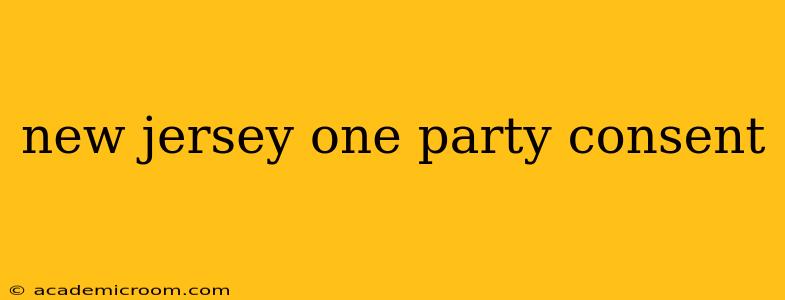New Jersey is a one-party consent state when it comes to recording conversations. This means that only one participant in a conversation needs to be aware of the recording for it to be legal. This seemingly straightforward concept, however, has nuances and exceptions that require careful understanding. This guide will delve into the specifics of New Jersey's one-party consent law, addressing common questions and concerns.
What is One-Party Consent?
One-party consent means that as long as at least one party to a conversation is aware that the conversation is being recorded, the recording is legal. This contrasts with two-party consent states, where all parties must consent to the recording. In New Jersey, you do not need to inform the other person that you are recording your conversation with them. However, this doesn't mean there are no limitations or ethical considerations.
Is it Legal to Record a Conversation in New Jersey Without Telling the Other Person?
Yes, it's legal in New Jersey to record a conversation as long as you are a party to the conversation. You are not required to inform the other person(s) involved. This applies to in-person conversations, phone calls, and other forms of audio recording.
What are the Exceptions to New Jersey's One-Party Consent Law?
While New Jersey is a one-party consent state, there are crucial exceptions and situations where recording conversations, even with one-party consent, might still be illegal. These include:
-
Reasonable Expectation of Privacy: Recording someone in a place where they have a reasonable expectation of privacy, such as a bathroom or changing room, without their knowledge, is illegal regardless of one-party consent laws. The focus here shifts from the consent to the violation of privacy itself.
-
Wiretapping Federal Laws: While New Jersey's law governs in-state recordings, federal laws may apply in certain situations, such as intercepting electronic communications or phone calls across state lines. These federal laws often have stricter requirements.
-
Illegal Purposes: Recording a conversation with the intent to commit a crime, such as blackmail or extortion, is illegal regardless of consent. The use of the recording, not just the act of recording, is key here.
Can I Record a Private Conversation in New Jersey Without Consent?
No, generally you cannot record a private conversation in New Jersey without at least one party's knowledge (yourself). As mentioned above, a reasonable expectation of privacy exists in certain locations, making recording in these areas without consent illegal. This is not a matter of consent but a violation of privacy laws.
What Happens if I Break New Jersey's Recording Laws?
Violation of New Jersey's recording laws can result in criminal and/or civil penalties, including fines and potential lawsuits. The severity of the penalties will depend on the specifics of the situation and the intent behind the recording.
Is it Ethical to Record Conversations in New Jersey Even If It's Legal?
While legally permissible in many situations, the ethical implications of recording conversations should be carefully considered. Transparency and informed consent, even if not legally required, build trust and avoid potential misunderstandings or conflicts. Consider whether recording is truly necessary and whether it could be perceived negatively by the other party.
Conclusion
New Jersey's one-party consent law provides clarity regarding the legality of recording conversations. However, navigating this law requires careful consideration of exceptions related to privacy, federal regulations, and the intended use of the recordings. Always err on the side of caution and consider the ethical implications before recording any conversation. If you have any doubts or concerns, consulting a legal professional is always recommended. This information is for general guidance only and does not constitute legal advice.
